Personal Leadership Journey: A Reflection on Skills and Growth
VerifiedAdded on 2023/06/08
|7
|1429
|374
Essay
AI Summary
This essay provides a comprehensive self-reflection on leadership skills and qualities, emphasizing the importance of authenticity, emotional intelligence, and continuous development. The author discusses their professional journey, highlighting instances where they demonstrated key leadership traits such as integrity, energy, and empathy. The essay also identifies areas for improvement, outlining a detailed action plan to further enhance leadership competencies through strategic participation, improved communication, courageous decision-making, and empowerment of others. The author's commitment to both organizational goals and employee well-being underscores their belief in the value of strong leadership for fostering growth and development within an organization. Desklib offers a wide range of similar essays and study tools to aid students in their academic pursuits.
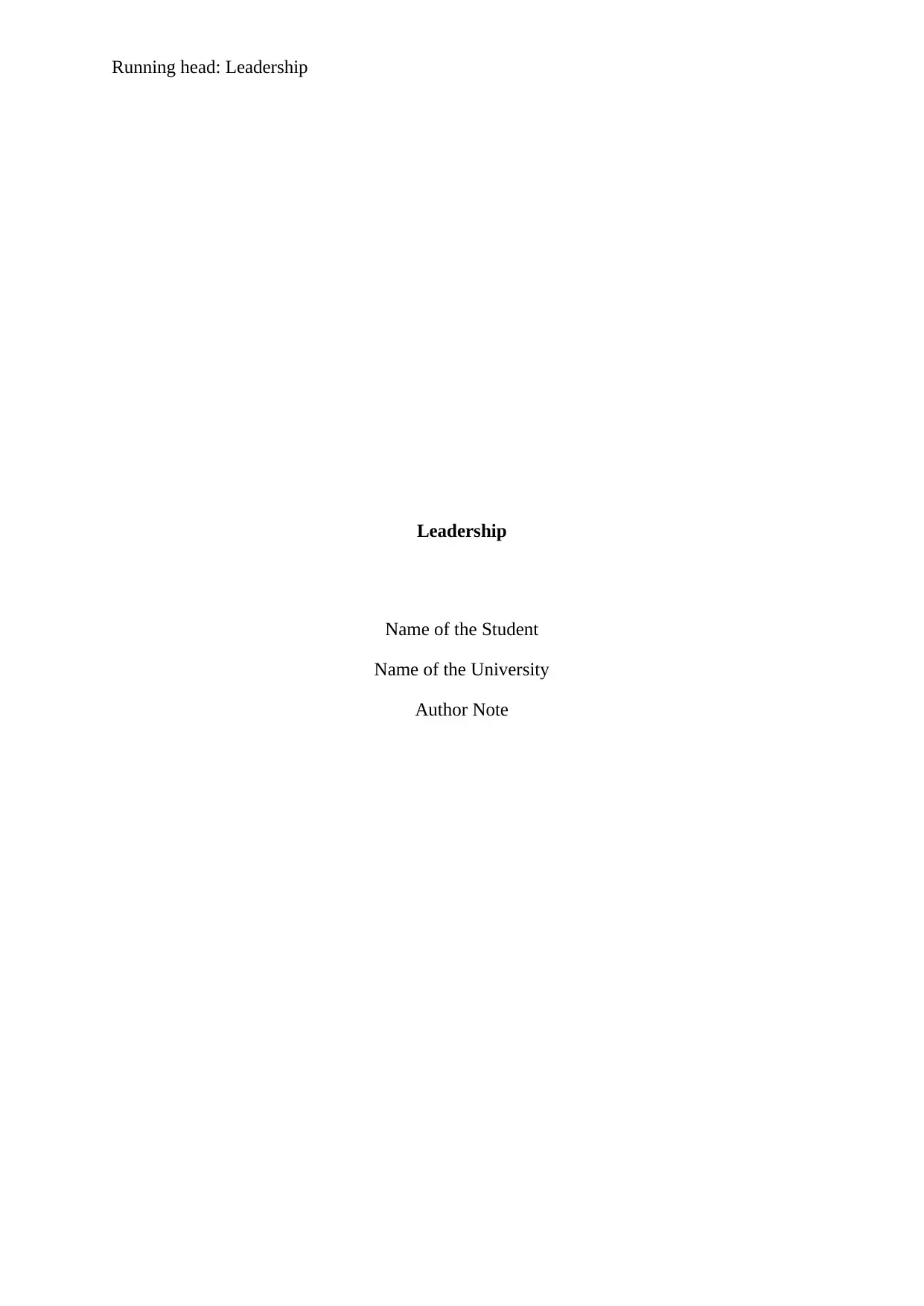
Running head: Leadership
Leadership
Name of the Student
Name of the University
Author Note
Leadership
Name of the Student
Name of the University
Author Note
Paraphrase This Document
Need a fresh take? Get an instant paraphrase of this document with our AI Paraphraser
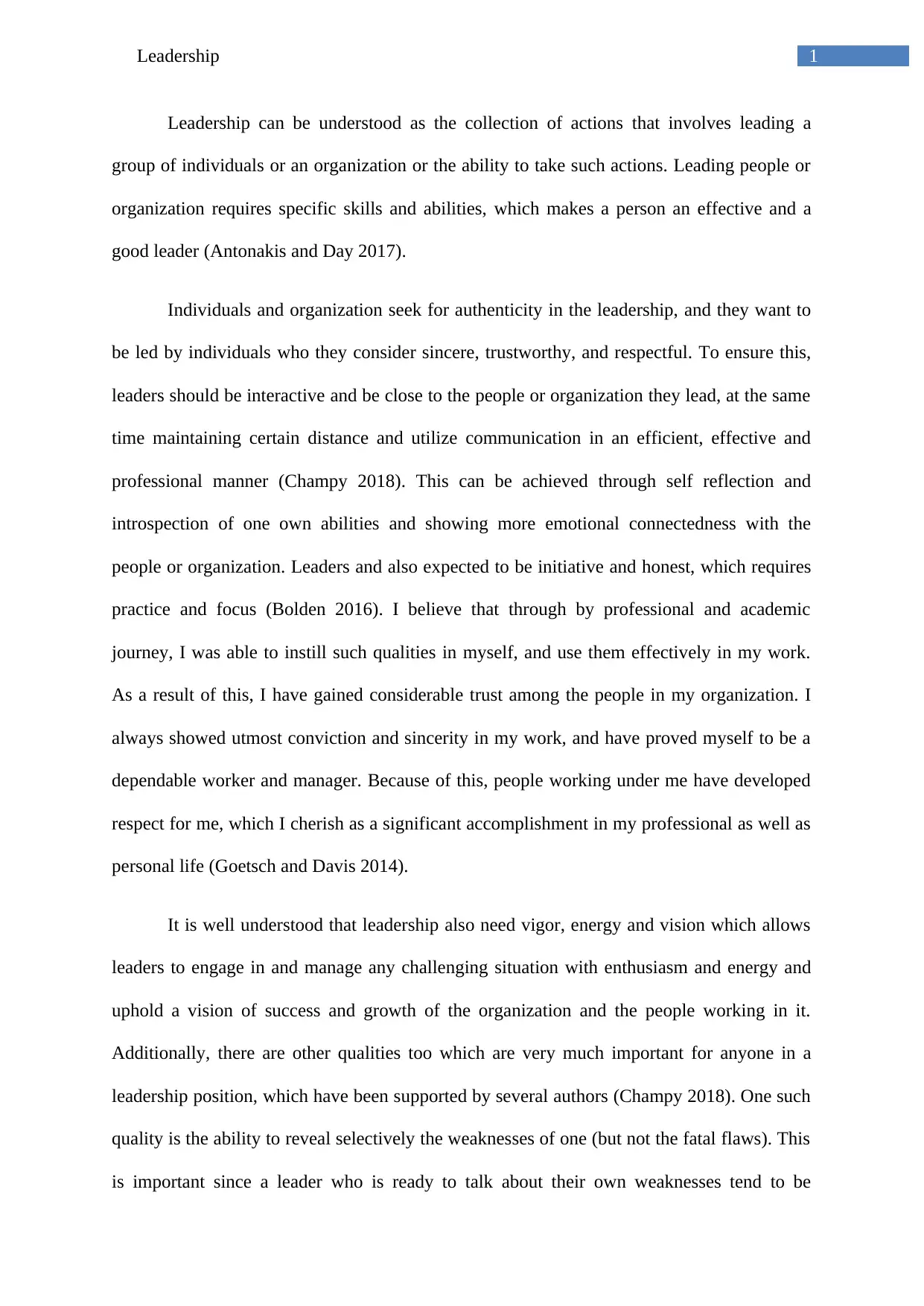
1Leadership
Leadership can be understood as the collection of actions that involves leading a
group of individuals or an organization or the ability to take such actions. Leading people or
organization requires specific skills and abilities, which makes a person an effective and a
good leader (Antonakis and Day 2017).
Individuals and organization seek for authenticity in the leadership, and they want to
be led by individuals who they consider sincere, trustworthy, and respectful. To ensure this,
leaders should be interactive and be close to the people or organization they lead, at the same
time maintaining certain distance and utilize communication in an efficient, effective and
professional manner (Champy 2018). This can be achieved through self reflection and
introspection of one own abilities and showing more emotional connectedness with the
people or organization. Leaders and also expected to be initiative and honest, which requires
practice and focus (Bolden 2016). I believe that through by professional and academic
journey, I was able to instill such qualities in myself, and use them effectively in my work.
As a result of this, I have gained considerable trust among the people in my organization. I
always showed utmost conviction and sincerity in my work, and have proved myself to be a
dependable worker and manager. Because of this, people working under me have developed
respect for me, which I cherish as a significant accomplishment in my professional as well as
personal life (Goetsch and Davis 2014).
It is well understood that leadership also need vigor, energy and vision which allows
leaders to engage in and manage any challenging situation with enthusiasm and energy and
uphold a vision of success and growth of the organization and the people working in it.
Additionally, there are other qualities too which are very much important for anyone in a
leadership position, which have been supported by several authors (Champy 2018). One such
quality is the ability to reveal selectively the weaknesses of one (but not the fatal flaws). This
is important since a leader who is ready to talk about their own weaknesses tend to be
Leadership can be understood as the collection of actions that involves leading a
group of individuals or an organization or the ability to take such actions. Leading people or
organization requires specific skills and abilities, which makes a person an effective and a
good leader (Antonakis and Day 2017).
Individuals and organization seek for authenticity in the leadership, and they want to
be led by individuals who they consider sincere, trustworthy, and respectful. To ensure this,
leaders should be interactive and be close to the people or organization they lead, at the same
time maintaining certain distance and utilize communication in an efficient, effective and
professional manner (Champy 2018). This can be achieved through self reflection and
introspection of one own abilities and showing more emotional connectedness with the
people or organization. Leaders and also expected to be initiative and honest, which requires
practice and focus (Bolden 2016). I believe that through by professional and academic
journey, I was able to instill such qualities in myself, and use them effectively in my work.
As a result of this, I have gained considerable trust among the people in my organization. I
always showed utmost conviction and sincerity in my work, and have proved myself to be a
dependable worker and manager. Because of this, people working under me have developed
respect for me, which I cherish as a significant accomplishment in my professional as well as
personal life (Goetsch and Davis 2014).
It is well understood that leadership also need vigor, energy and vision which allows
leaders to engage in and manage any challenging situation with enthusiasm and energy and
uphold a vision of success and growth of the organization and the people working in it.
Additionally, there are other qualities too which are very much important for anyone in a
leadership position, which have been supported by several authors (Champy 2018). One such
quality is the ability to reveal selectively the weaknesses of one (but not the fatal flaws). This
is important since a leader who is ready to talk about their own weaknesses tend to be
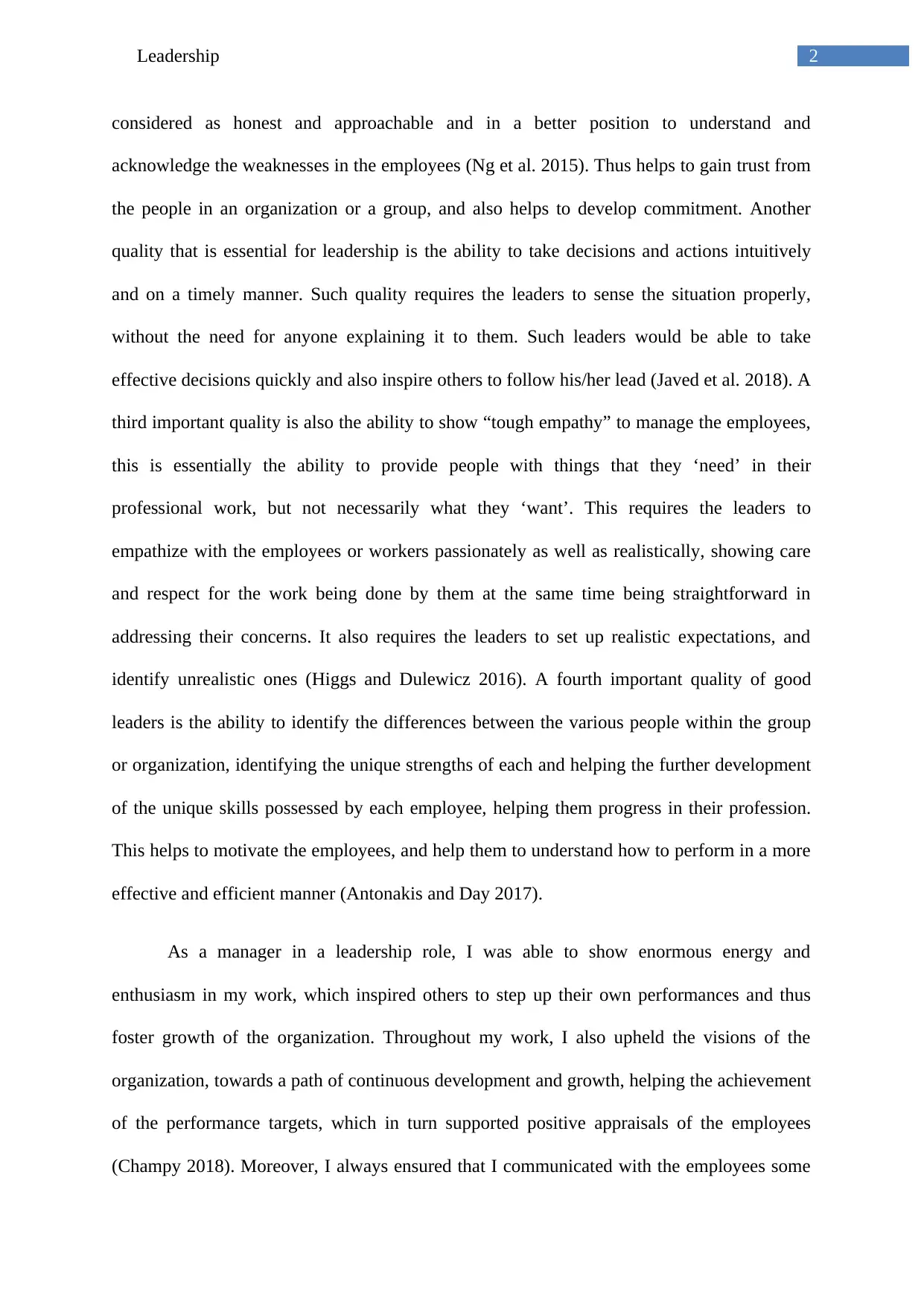
2Leadership
considered as honest and approachable and in a better position to understand and
acknowledge the weaknesses in the employees (Ng et al. 2015). Thus helps to gain trust from
the people in an organization or a group, and also helps to develop commitment. Another
quality that is essential for leadership is the ability to take decisions and actions intuitively
and on a timely manner. Such quality requires the leaders to sense the situation properly,
without the need for anyone explaining it to them. Such leaders would be able to take
effective decisions quickly and also inspire others to follow his/her lead (Javed et al. 2018). A
third important quality is also the ability to show “tough empathy” to manage the employees,
this is essentially the ability to provide people with things that they ‘need’ in their
professional work, but not necessarily what they ‘want’. This requires the leaders to
empathize with the employees or workers passionately as well as realistically, showing care
and respect for the work being done by them at the same time being straightforward in
addressing their concerns. It also requires the leaders to set up realistic expectations, and
identify unrealistic ones (Higgs and Dulewicz 2016). A fourth important quality of good
leaders is the ability to identify the differences between the various people within the group
or organization, identifying the unique strengths of each and helping the further development
of the unique skills possessed by each employee, helping them progress in their profession.
This helps to motivate the employees, and help them to understand how to perform in a more
effective and efficient manner (Antonakis and Day 2017).
As a manager in a leadership role, I was able to show enormous energy and
enthusiasm in my work, which inspired others to step up their own performances and thus
foster growth of the organization. Throughout my work, I also upheld the visions of the
organization, towards a path of continuous development and growth, helping the achievement
of the performance targets, which in turn supported positive appraisals of the employees
(Champy 2018). Moreover, I always ensured that I communicated with the employees some
considered as honest and approachable and in a better position to understand and
acknowledge the weaknesses in the employees (Ng et al. 2015). Thus helps to gain trust from
the people in an organization or a group, and also helps to develop commitment. Another
quality that is essential for leadership is the ability to take decisions and actions intuitively
and on a timely manner. Such quality requires the leaders to sense the situation properly,
without the need for anyone explaining it to them. Such leaders would be able to take
effective decisions quickly and also inspire others to follow his/her lead (Javed et al. 2018). A
third important quality is also the ability to show “tough empathy” to manage the employees,
this is essentially the ability to provide people with things that they ‘need’ in their
professional work, but not necessarily what they ‘want’. This requires the leaders to
empathize with the employees or workers passionately as well as realistically, showing care
and respect for the work being done by them at the same time being straightforward in
addressing their concerns. It also requires the leaders to set up realistic expectations, and
identify unrealistic ones (Higgs and Dulewicz 2016). A fourth important quality of good
leaders is the ability to identify the differences between the various people within the group
or organization, identifying the unique strengths of each and helping the further development
of the unique skills possessed by each employee, helping them progress in their profession.
This helps to motivate the employees, and help them to understand how to perform in a more
effective and efficient manner (Antonakis and Day 2017).
As a manager in a leadership role, I was able to show enormous energy and
enthusiasm in my work, which inspired others to step up their own performances and thus
foster growth of the organization. Throughout my work, I also upheld the visions of the
organization, towards a path of continuous development and growth, helping the achievement
of the performance targets, which in turn supported positive appraisals of the employees
(Champy 2018). Moreover, I always ensured that I communicated with the employees some
⊘ This is a preview!⊘
Do you want full access?
Subscribe today to unlock all pages.

Trusted by 1+ million students worldwide
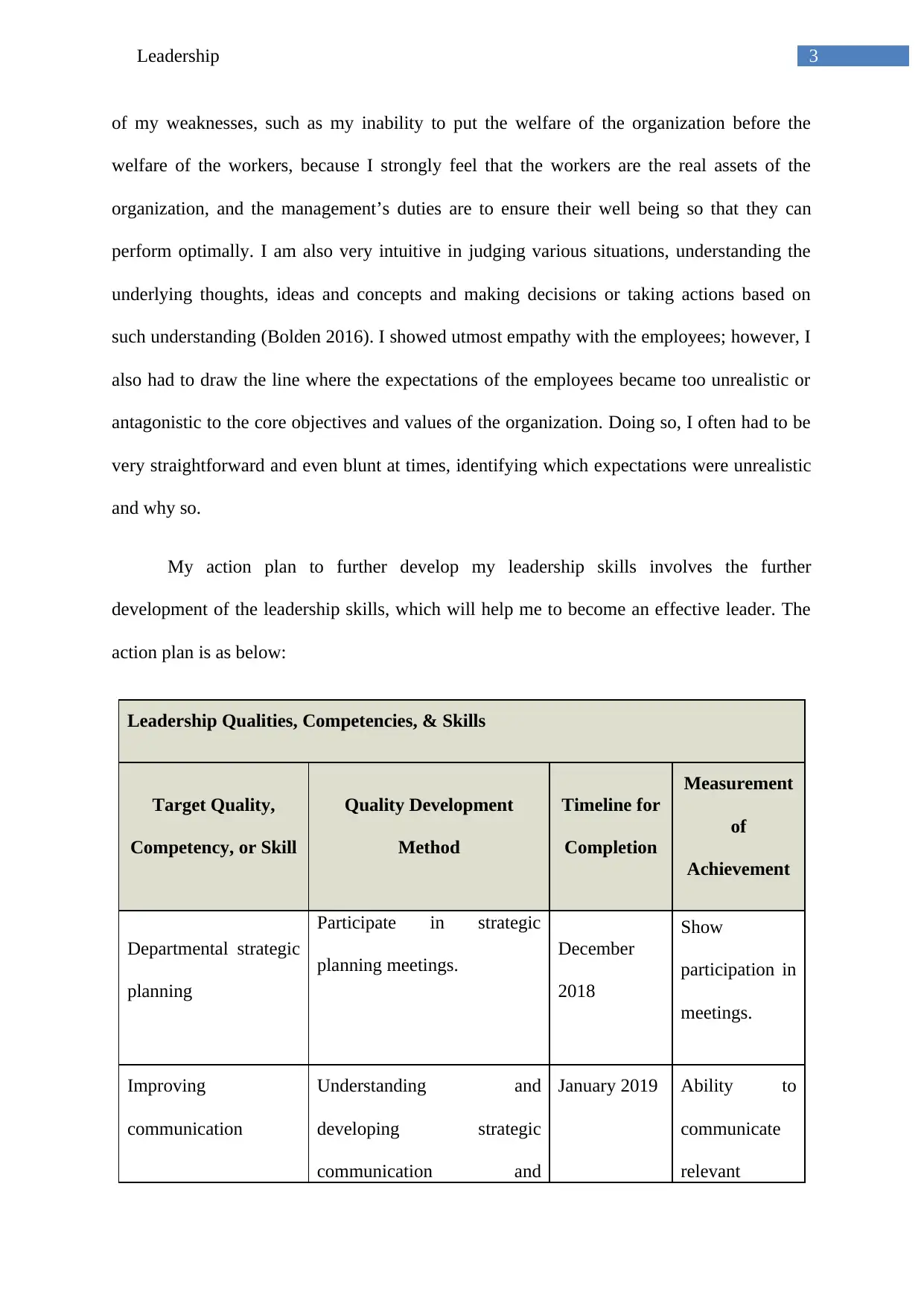
3Leadership
of my weaknesses, such as my inability to put the welfare of the organization before the
welfare of the workers, because I strongly feel that the workers are the real assets of the
organization, and the management’s duties are to ensure their well being so that they can
perform optimally. I am also very intuitive in judging various situations, understanding the
underlying thoughts, ideas and concepts and making decisions or taking actions based on
such understanding (Bolden 2016). I showed utmost empathy with the employees; however, I
also had to draw the line where the expectations of the employees became too unrealistic or
antagonistic to the core objectives and values of the organization. Doing so, I often had to be
very straightforward and even blunt at times, identifying which expectations were unrealistic
and why so.
My action plan to further develop my leadership skills involves the further
development of the leadership skills, which will help me to become an effective leader. The
action plan is as below:
Leadership Qualities, Competencies, & Skills
Target Quality,
Competency, or Skill
Quality Development
Method
Timeline for
Completion
Measurement
of
Achievement
Departmental strategic
planning
Participate in strategic
planning meetings. December
2018
Show
participation in
meetings.
Improving
communication
Understanding and
developing strategic
communication and
January 2019 Ability to
communicate
relevant
of my weaknesses, such as my inability to put the welfare of the organization before the
welfare of the workers, because I strongly feel that the workers are the real assets of the
organization, and the management’s duties are to ensure their well being so that they can
perform optimally. I am also very intuitive in judging various situations, understanding the
underlying thoughts, ideas and concepts and making decisions or taking actions based on
such understanding (Bolden 2016). I showed utmost empathy with the employees; however, I
also had to draw the line where the expectations of the employees became too unrealistic or
antagonistic to the core objectives and values of the organization. Doing so, I often had to be
very straightforward and even blunt at times, identifying which expectations were unrealistic
and why so.
My action plan to further develop my leadership skills involves the further
development of the leadership skills, which will help me to become an effective leader. The
action plan is as below:
Leadership Qualities, Competencies, & Skills
Target Quality,
Competency, or Skill
Quality Development
Method
Timeline for
Completion
Measurement
of
Achievement
Departmental strategic
planning
Participate in strategic
planning meetings. December
2018
Show
participation in
meetings.
Improving
communication
Understanding and
developing strategic
communication and
January 2019 Ability to
communicate
relevant
Paraphrase This Document
Need a fresh take? Get an instant paraphrase of this document with our AI Paraphraser
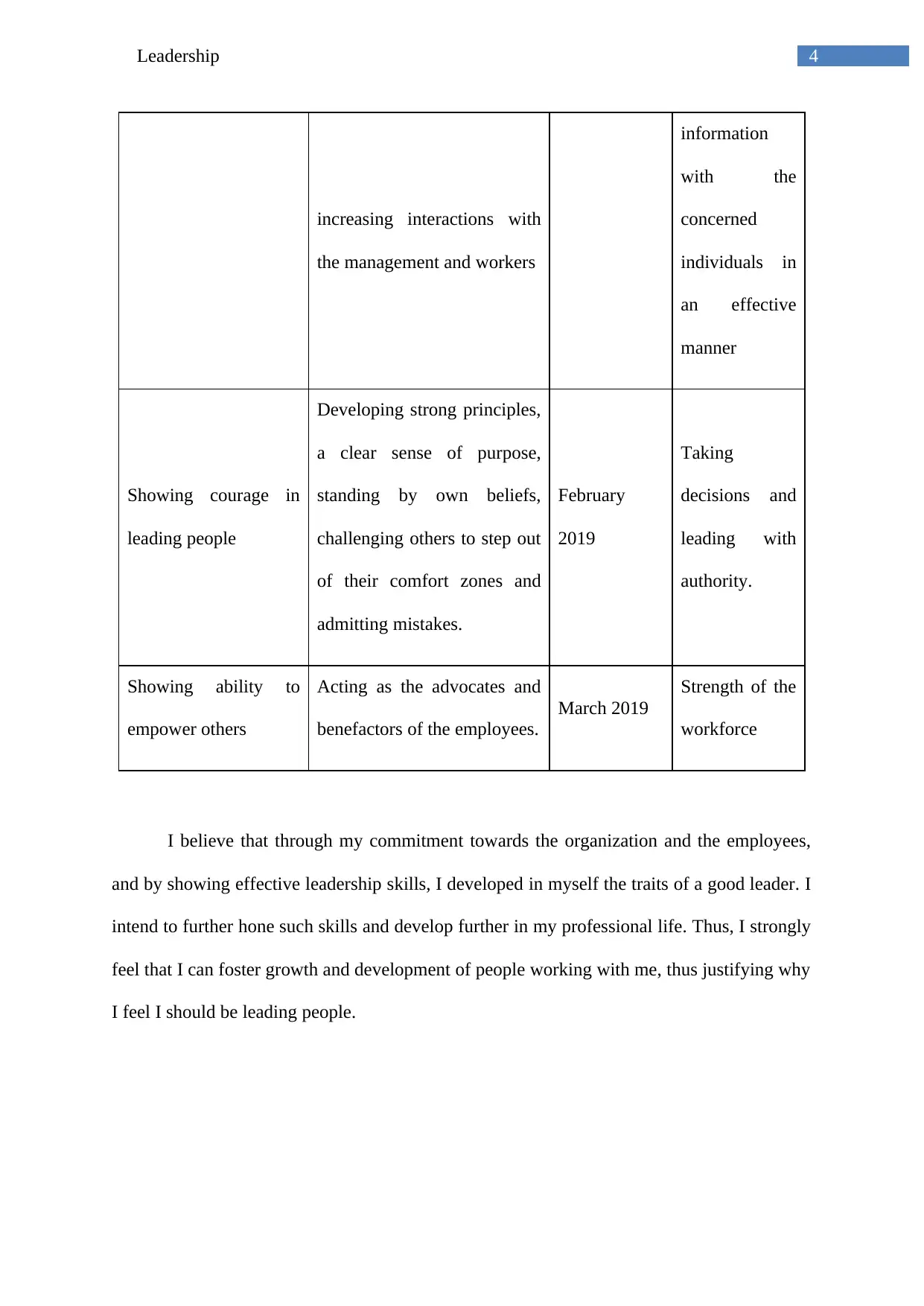
4Leadership
increasing interactions with
the management and workers
information
with the
concerned
individuals in
an effective
manner
Showing courage in
leading people
Developing strong principles,
a clear sense of purpose,
standing by own beliefs,
challenging others to step out
of their comfort zones and
admitting mistakes.
February
2019
Taking
decisions and
leading with
authority.
Showing ability to
empower others
Acting as the advocates and
benefactors of the employees.
March 2019
Strength of the
workforce
I believe that through my commitment towards the organization and the employees,
and by showing effective leadership skills, I developed in myself the traits of a good leader. I
intend to further hone such skills and develop further in my professional life. Thus, I strongly
feel that I can foster growth and development of people working with me, thus justifying why
I feel I should be leading people.
increasing interactions with
the management and workers
information
with the
concerned
individuals in
an effective
manner
Showing courage in
leading people
Developing strong principles,
a clear sense of purpose,
standing by own beliefs,
challenging others to step out
of their comfort zones and
admitting mistakes.
February
2019
Taking
decisions and
leading with
authority.
Showing ability to
empower others
Acting as the advocates and
benefactors of the employees.
March 2019
Strength of the
workforce
I believe that through my commitment towards the organization and the employees,
and by showing effective leadership skills, I developed in myself the traits of a good leader. I
intend to further hone such skills and develop further in my professional life. Thus, I strongly
feel that I can foster growth and development of people working with me, thus justifying why
I feel I should be leading people.
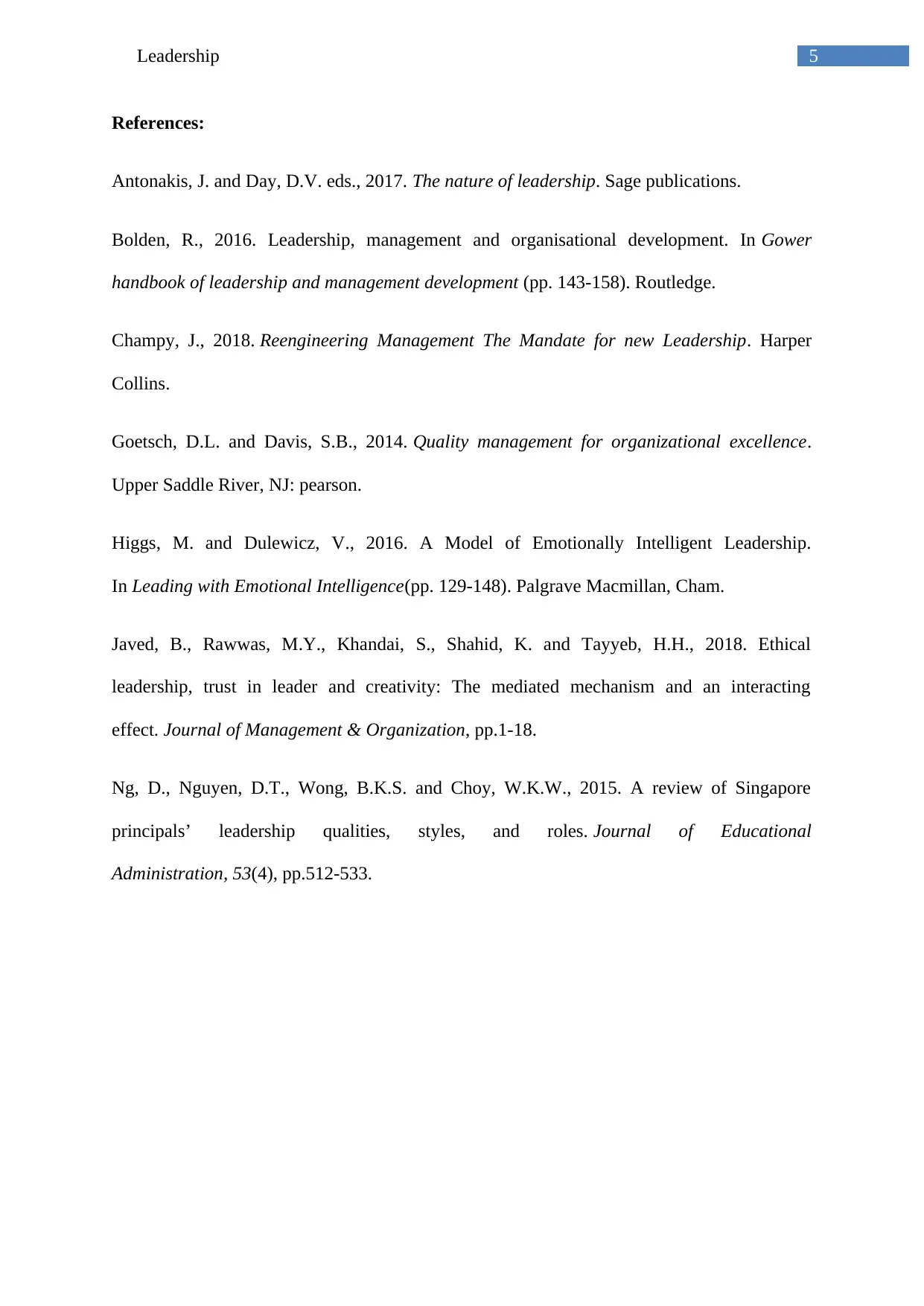
5Leadership
References:
Antonakis, J. and Day, D.V. eds., 2017. The nature of leadership. Sage publications.
Bolden, R., 2016. Leadership, management and organisational development. In Gower
handbook of leadership and management development (pp. 143-158). Routledge.
Champy, J., 2018. Reengineering Management The Mandate for new Leadership. Harper
Collins.
Goetsch, D.L. and Davis, S.B., 2014. Quality management for organizational excellence.
Upper Saddle River, NJ: pearson.
Higgs, M. and Dulewicz, V., 2016. A Model of Emotionally Intelligent Leadership.
In Leading with Emotional Intelligence(pp. 129-148). Palgrave Macmillan, Cham.
Javed, B., Rawwas, M.Y., Khandai, S., Shahid, K. and Tayyeb, H.H., 2018. Ethical
leadership, trust in leader and creativity: The mediated mechanism and an interacting
effect. Journal of Management & Organization, pp.1-18.
Ng, D., Nguyen, D.T., Wong, B.K.S. and Choy, W.K.W., 2015. A review of Singapore
principals’ leadership qualities, styles, and roles. Journal of Educational
Administration, 53(4), pp.512-533.
References:
Antonakis, J. and Day, D.V. eds., 2017. The nature of leadership. Sage publications.
Bolden, R., 2016. Leadership, management and organisational development. In Gower
handbook of leadership and management development (pp. 143-158). Routledge.
Champy, J., 2018. Reengineering Management The Mandate for new Leadership. Harper
Collins.
Goetsch, D.L. and Davis, S.B., 2014. Quality management for organizational excellence.
Upper Saddle River, NJ: pearson.
Higgs, M. and Dulewicz, V., 2016. A Model of Emotionally Intelligent Leadership.
In Leading with Emotional Intelligence(pp. 129-148). Palgrave Macmillan, Cham.
Javed, B., Rawwas, M.Y., Khandai, S., Shahid, K. and Tayyeb, H.H., 2018. Ethical
leadership, trust in leader and creativity: The mediated mechanism and an interacting
effect. Journal of Management & Organization, pp.1-18.
Ng, D., Nguyen, D.T., Wong, B.K.S. and Choy, W.K.W., 2015. A review of Singapore
principals’ leadership qualities, styles, and roles. Journal of Educational
Administration, 53(4), pp.512-533.
⊘ This is a preview!⊘
Do you want full access?
Subscribe today to unlock all pages.

Trusted by 1+ million students worldwide
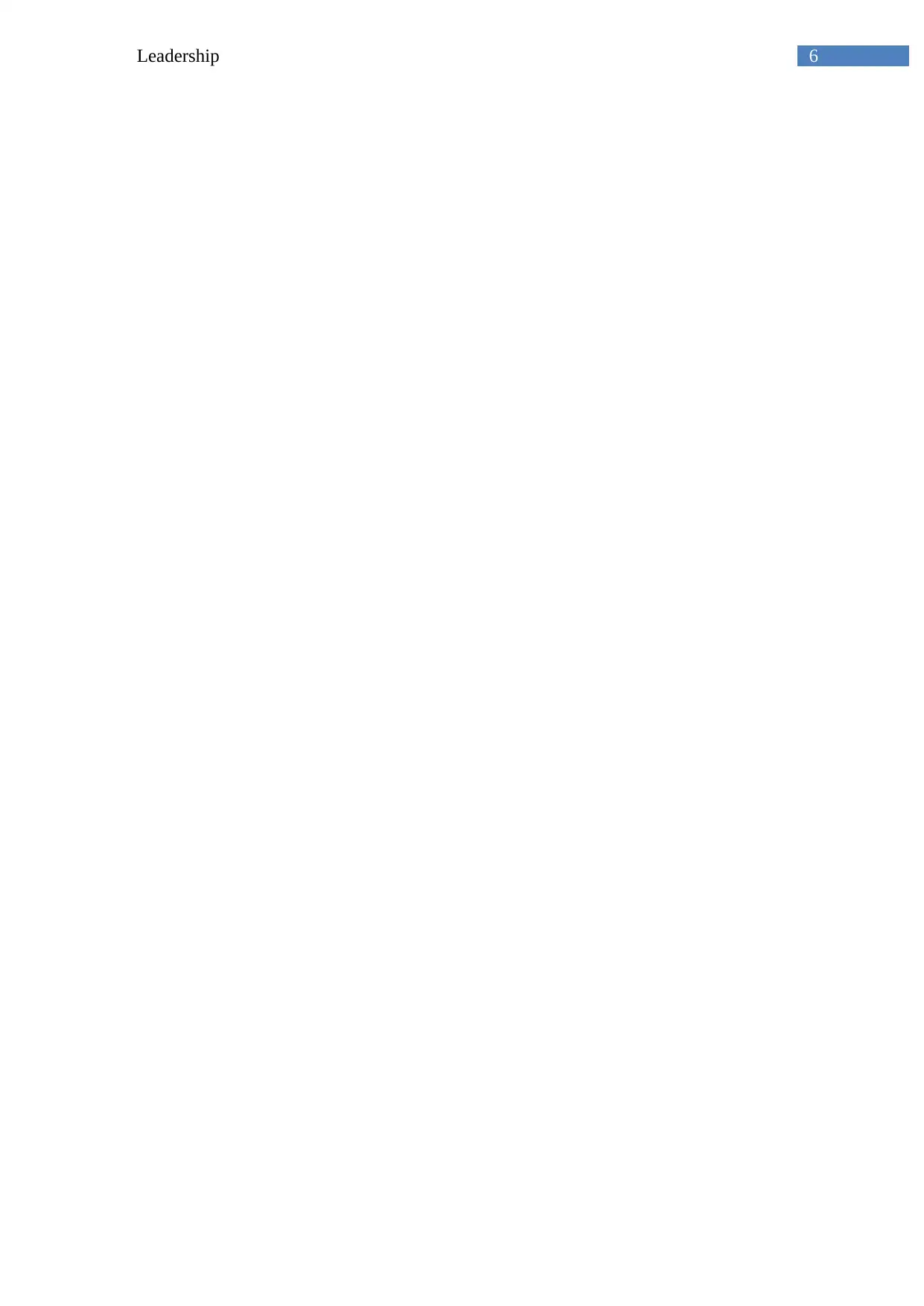
6Leadership
1 out of 7
Related Documents
Your All-in-One AI-Powered Toolkit for Academic Success.
+13062052269
info@desklib.com
Available 24*7 on WhatsApp / Email
![[object Object]](/_next/static/media/star-bottom.7253800d.svg)
Unlock your academic potential
Copyright © 2020–2026 A2Z Services. All Rights Reserved. Developed and managed by ZUCOL.





